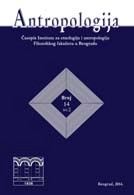ВРЕМЕ ПРИКРИВАЊА: ИДЕНТИТЕТСКА СТРАТЕГИЈА СВЕСНОГ ТРАЈНОГ ОДБАЦИВАЊА И/ИЛИ ПРИВРЕМЕНОГ ПРИКРИВАЊА ЕТНИЧКОГ ИДЕНТИТЕТА НЕМАЦА У БАНАТУ У ДРУГОЈ ПОЛОВИНИ 20. ВЕКА
TIMES OF DISGUISE: IDENTITYSTRATEGY OF CONSCIOUS
PERMANENT RENUNCIATION AND/OR TEMPORARY
DISGUISEOF ETHNIC IDENTITY BY GERMANS IN BANAT IN SECOND HALF OF 20TH CENTURY
Author(s): Aleksandar KrelSubject(s): Nationalism Studies, WW II and following years (1940 - 1949), Post-War period (1950 - 1989), Inter-Ethnic Relations, Ethnic Minorities Studies, Politics and Identity, Identity of Collectives
Published by: Институт за етнологију и антропологију
Keywords: Germans; national minority; Banat; Vojvodina; identity strategies;
Summary/Abstract: In this paper I study the contextualisation of identity strategy of conscious permanent renunciation and/or temporary disguise of ethnic identity by Germans in Banat in the second half of 20th century. As it was the case with their co-ethnics in Yugoslavia, Germans in Banat opted for ethnic mimicry due to the complex historical and political circumstances in the middle of the last century. The abandoning of this identity strategy occurred only after the breakup of SFRJ /Socialist Federative Republic of Yugoslavia/, when Germans decided to come out to the public scene and to renew the constitution of the German national minority in this region. Based on the empirical evidence, collected during interviews with members of local German associations in Banat, in this paper I analyse the causes which were a precursor to the emergence of this strategy, the consequences its implementation produced, and the reasons for substitution of the above-mentioned identity strategies.
Journal: Antropologija
- Issue Year: 14/2014
- Issue No: 2
- Page Range: 89-100
- Page Count: 12
- Language: Serbian

